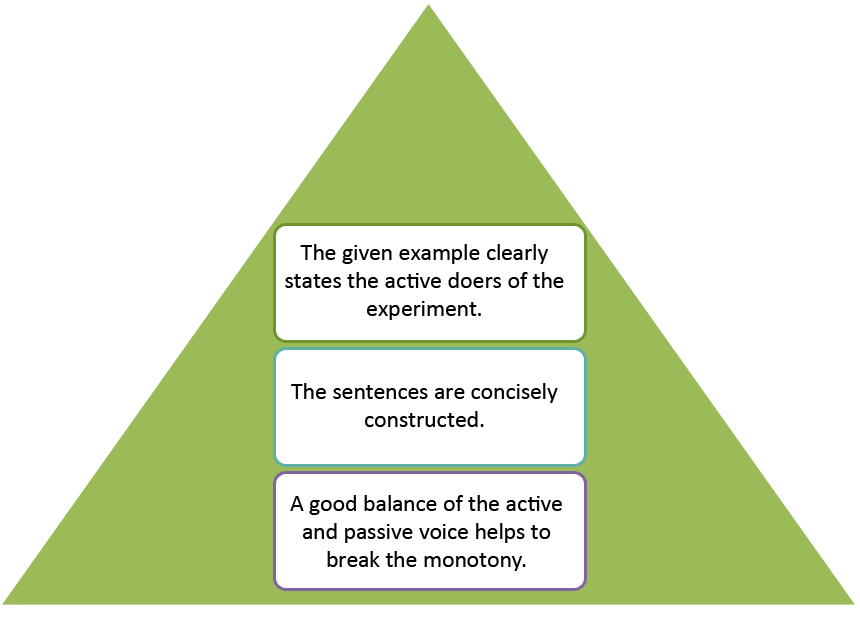How to Effectively Use Active and Passive Voice in Academic Writing

A sentence is considered to be in passive voice when the subject of a sentence is the object being acted on. Active voice, on the other hand, is where the subject is the one doing the acting. In the 20th century, passive voice was a dominant characteristic of scientific writing; however, there has been a discernible shift in consensus in recent years. Most writing guides (such as APA [6th edition, section 3.18]), root for the active voice for clarity and conciseness. According to scholars, the general opinion is that the passive voice makes writing flat and insinuates evasion of responsibility in writing of any form, not just scientific writing.
In fact, some scholars have actually shown that active voice was the preferred form till the beginning of the 20th century when the trend of objectivity became favored. According to Ding (1998), in writing, the world should essentially be represented “in terms of objects, things, and materials.” Passive voice can obscure agents and readers can lose sight of the relevance of a prose that is dominated by things and objects. However, in the art of writing, polarized views often become irrelevant and a balance must be achieved by using the two voices contextually.
After all, human agents are responsible for designing experiments…writing awkward phrases to avoid admitting their responsibility and their presence is an odd way of being objective. -Jane J. Robinson
The APA recommends that verb tenses and voices should be used carefully. Try not to be reluctant to utilize the active voice – particularly in the Discussion section, where it is imperative to express that it is you supposing certain things and having specific assessments. In the Methods section, it is satisfactory to break the dullness of numerous passive voice sentences with the usage of the active voice. A response on Quora (John Geare, 2015) sums up the required balance in a succinct manner:
In academic writing, passive voice is used to describe a process, the results of study, or similar material which is objective in nature. But active voice is used to describe actions.
Related: Having trouble with grammar and punctuations in your research paper? Get help from native language experts now!
John Geare provides a specific example for clarity.
My colleagues A, B, [names changed] and I, designed an experiment to test the impact on worker perceptions of well-being when domesticated cats were allowed to freely roam various work environments in which the subjects were normally employed. Three test environments were selected for our experiments: a law office, a laboratory in which experiments were performed using laboratory rats, and an automobile assembly line. One-way mirrored glass panels were installed to allow video cameras to record the activity, and researchers to observe the same and take notes. We secretly inserted observers directly into the work environment. These observers posed as outside contractors, and were uniformed as maintenance and cleaning staff, coffee and water service vendors, and similar supporting personnel. The observers were drawn from the students who were matriculated into the experimental psychology courses from which this study had been developed as an example of such studies generally.

You can check the references for more information on the usage of active and passive voice across writing styles.
References:
Vijith Assar (2015, September 3) An Interactive Guide To Ambiguous Grammar. Retrieved from https://www.mcsweeneys.net/articles/an-interactive-guide-to-ambiguous-grammar
Josh Bernoff, WOBS LLC (2016, April 26) A passel of pernicious passive voice (Master Post). Retrieved from http://withoutbullshit.com/blog/master-post-passel-pernicious-passive-voice
Duke University Scientific Writing Resource. Passive Voice in Scientific Writing. Retrieved from https://cgi.duke.edu/web/sciwriting/index.php?action=passive_voice
Leong Ping Alvin (2014, March 13) The passive voice in scientific writing. The current norm in science journals. Retrieved from https://jcom.sissa.it/sites/default/files/documents/JCOM_1301_2014_A03.pdf
Language and Learning Online. Active or passive voice? Retrieved from http://www.monash.edu.au/lls/llonline/writing/general/lit-reviews/5.xml
John Geare (2015, August 29) Why shouldn’t we use a passive voice in academic writing? Retrieved from https://www.quora.com/Why-shouldnt-we-use-a-passive-voice-in-academic-writing






hi